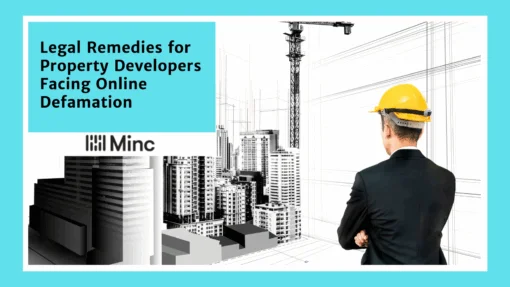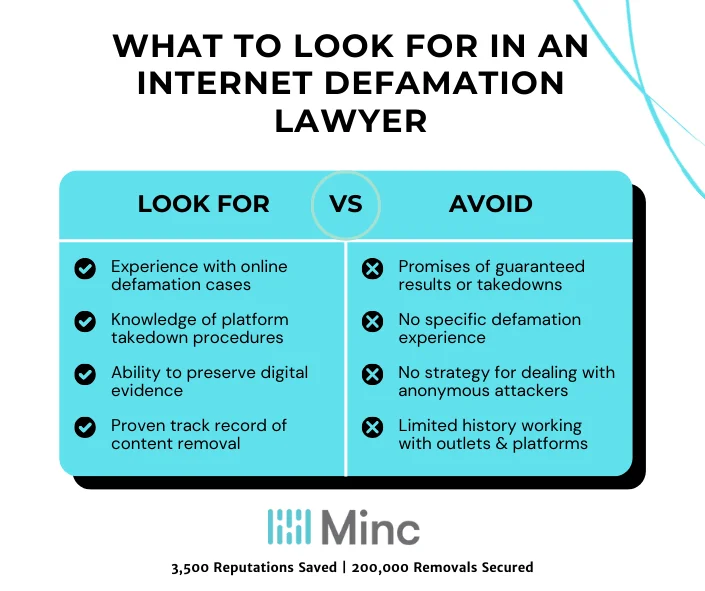
- Originally Published on August 28, 2025
Legal Remedies for Property Developers Facing Online Defamation
Reputation is the foundation of every successful real estate project. Investors, lenders, municipalities, and community members all rely on the credibility of the developer behind a project. A strong track record can unlock financing, accelerate approvals, and build the trust necessary for long-term success. Unfortunately, in today’s digital environment, a single false allegation can quickly erode that trust and place an entire development at risk.
False claims can spread across blogs, forums, and social media with little oversight. Even when untrue, these statements can dominate search engine results, deter investors, and create lasting doubt. Developers must be prepared not only to respond but also to pursue meaningful remedies when their reputations come under attack.
This article by Minc Law examines why developers are particularly vulnerable to online defamation, explains the damaging effects of false statements, and outlines the legal tools available to restore reputations and protect future projects.
Why Real Estate Developers Are Frequent Targets of Defamation
The Visibility of Large Projects
Major developments rarely unfold quietly. Local media, community groups, and political stakeholders all scrutinize proposals and construction progress. Because projects are highly visible, they are more likely to attract criticism and misinformation.
The Role of Competitors
Real estate is a competitive industry. Rival developers or business interests sometimes use false statements to gain an advantage in bidding, financing, or tenant recruitment. Competitors may plant misleading content on forums or publish articles intended to undermine trust in a rival project.
Community Opposition and Activism
Neighborhood groups and activists frequently oppose projects due to concerns about traffic, zoning, or affordability. While legitimate criticism is a normal part of development, it sometimes crosses the line into defamation when opponents publish untrue allegations about the developer’s conduct.
Investor and Lender Sensitivity
Reputation is critical to financial partners. Even a single blog post alleging fraud or unethical practices can cause lenders to hesitate or investors to withdraw. The perception of risk can be just as damaging as proven misconduct.
The Power of Search Engines
Google and other search engines reward recent and highly engaged content. This means a defamatory article can dominate search results for a developer’s name or project, making it the first impression for potential partners or buyers.
Industry-Specific Vulnerabilities
Different types of developers face unique risks:
- Luxury Residential Developers often become targets of wealth inequality activists who view high-end projects as symbols of gentrification or social disparity.
- Commercial and Mixed-Use Developers face scrutiny over traffic impacts, parking, and changes to neighborhood character.
- Affordable Housing Developers navigate political pressures and NIMBY opposition while managing complex public funding requirements.
- Industrial and Logistics Developers frequently encounter environmental and safety allegations, even when projects meet all regulatory standards.
The Consequences of Online Defamation for Developers
Loss of Deals and Financing
Investors and banks are often risk-averse, making them particularly susceptible to reputational concerns. Even unverified allegations of corruption or fraud can immediately scare off financial support, forcing developers to seek alternative funding at higher costs or with less favorable terms. Private equity firms and institutional investors often conduct extensive due diligence, which includes online reputation research, resulting in defamatory content frequently surfacing during critical funding discussions.
Delayed or Denied Approvals
City councils and zoning boards frequently monitor public sentiment as part of their decision-making process, particularly for controversial or high-profile projects. False allegations that gain traction in local media or social media can create political pressure for elected officials to delay or deny approvals, even when projects meet all technical requirements.
Damage to Community Relations
Local support is crucial for the successful development of projects that require community input or neighborhood cooperation. When defamatory statements spread unchecked through local social media groups, neighborhood associations, or community forums, they can fuel organized resistance and disrupt carefully built relationships with officials and residents.
Personal and Professional Stress
Defamation attacks are not limited to business consequences – they often create significant personal and professional stress for developers and their families. The psychological impact of seeing false allegations spread online can lead to sleeplessness, anxiety, and strain on personal relationships. Professional networks may distance themselves from developers facing public allegations, creating isolation at the very time support is most needed.
SEC and Regulatory Complications
For publicly traded development companies, defamatory attacks can create problems that go well beyond reputation. If the allegations are serious enough to affect stock prices, financing, or investor confidence, they may trigger SEC reporting obligations. What begins as an online smear can quickly escalate into shareholder concerns, regulatory inquiries, and heightened scrutiny from analysts, all of which amplify the damage beyond the original false statement.
Insurance and Bonding Issues
Surety companies and insurers monitor their clients’ reputations closely. Widespread negative coverage can affect bonding capacity, increase premiums, or trigger policy reviews at critical project milestones.
Understanding When Online Statements Become Defamation
Not all negative content qualifies as defamation. Developers must understand the legal threshold for taking action.
Opinion vs. Fact
Opinions, such as “I do not like this project,” are protected speech. However, statements of fact, such as “This developer committed fraud on a past project,” can be actionable if untrue.
Elements of Defamation
For a statement to be considered defamatory under U.S. law, it must generally meet four elements:
- The statement is false.
- It is presented as fact rather than opinion.
- It is communicated to a third party.
- It causes harm to the subject’s reputation.
Defamation Per Se in Development Contexts
Some statements are considered so harmful that the law presumes damages without requiring proof of specific losses. For developers and their leadership teams, these include:
- False allegations of fraud, bribery, or criminal conduct that undermine trust with investors, lenders, and regulators.
- Assertions of unsafe building practices suggesting projects fail to meet safety codes or are structurally unsound.
- Attacks on professional competence or licensing status that cast doubt on a developer’s qualifications.
- Personal attacks on owners or CEOs, such as accusations of financial misconduct or dishonesty, that damage both the individual’s reputation and the credibility of the company.
- Claims of financial instability or insolvency that discourage investors and disrupt financing.
Because these categories are treated as defamation per se, developers and executives can often seek relief more quickly without having to prove specific economic harm.
Legal Remedies Available to Developers
Developers who face online defamation are not powerless. There are multiple avenues to pursue depending on the severity of the attack, the identity of the publisher, and the scope of the harm.
Preserving Evidence
The first step is always to secure evidence. Online content can vanish in a matter of hours, and courts require a verifiable record. Attorneys often coordinate forensic captures of posts, preserve metadata, and may subpoena platforms to prevent the deletion of identifying information. For developers, it’s just as important to capture the broader context—whether the post was tied to a zoning battle, a financing announcement, or an activist campaign targeting the project.
Cease and Desist Letters and Retraction Demands
One of the most effective early remedies is a cease-and-desist letter. A well-crafted letter not only puts the defamer on notice but also demonstrates that the developer is prepared to escalate the matter if necessary. Retraction demands go a step further, requesting that content be removed, corrected, or publicly withdrawn. These tools serve several purposes simultaneously: they create a paper trail for future litigation, facilitate quick resolutions, and demonstrate that the developer made reasonable attempts to resolve the dispute before resorting to court.
Work With Experienced Counsel
Defamation cases in real estate differ from typical business disputes. They often erupt in the middle of multimillion-dollar financing rounds or sensitive approval processes. Experienced internet defamation counsel understands how false allegations can ripple through investor due diligence, lender confidence, and municipal decision-making. The right team can strike a balance between aggressive legal action and strategic discretion, coordinating litigation with public relations and investor communications.
Platform and Search Remedies
Developers are not limited to the courtroom. False content can often be challenged directly on the platform where it appears. DMCA takedowns may be used if stolen architectural renderings or project photos are posted. Policy-based complaints can secure removals when posts contain provably false claims about fraud or safety. Even when removal isn’t possible, lawyers can pursue de-indexing so defamatory content does not dominate search results for a developer’s name or project.
Negotiation and Strategic Settlement
Many cases can be resolved quietly through negotiation. Developers may secure retractions, corrections, or confidential settlements without the need for a lawsuit. These strategies are especially valuable when public hearings or financing deadlines are approaching and speed matters more than public vindication.
Litigation and Business Tort Claims
When reputational attacks threaten a major project, litigation may be the most powerful tool. Developers can file defamation suits to recover damages and obtain injunctions forcing the removal of false content. They may also pursue related business torts, such as tortious interference when investors or partners withdraw based on false claims, or commercial disparagement when lies cause measurable financial harm. Courts are increasingly recognizing reputational damage as an economic injury, which can result in significant financial recovery.
Unmasking Anonymous Attackers
Anonymous critics are common in development disputes, especially in contentious neighborhoods or competitive bidding situations. Through John Doe lawsuits, attorneys can often identify the individuals behind defamatory attacks. Once unmasked, attackers can face both civil liability and reputational consequences of their own.
What Damages Can I Recover in a Defamation Lawsuit?
Successful defamation lawsuits can yield substantial financial recoveries for real estate developers who have suffered reputational harm. Courts recognize that false statements can cause both immediate economic losses and long-term damage to a developer’s earning capacity and project valuations.
Immediate Economic Losses are often the most straightforward to prove and recover. These include withdrawn financing commitments that force developers to seek more expensive alternative funding, project delays caused by regulatory scrutiny that result in carrying costs and lost opportunities, and contract cancellations from tenants, vendors, or joint venture partners who withdraw due to reputational concerns. Insurance premium increases and coverage restrictions also fall into this category.
Long-Term Financial Impact can actually exceed immediate losses. Defamatory attacks create lasting clouds over a developer’s reputation, reducing future project valuations, increasing due diligence costs as partners demand additional verification, eliminating competitive advantages in bidding situations, and resulting in permanently higher financing costs as lenders perceive increased risk.
Damage Calculation Methods rely on expert witnesses who use sophisticated financial analysis to quantify reputational harm. Common approaches include market analysis that compares the developer’s performance before and after the defamatory attacks, discounted cash flow models that demonstrate reduced future earnings capacity, and comparable company analysis that shows how reputation affects industry valuations.
Recovery amounts vary significantly based on the developer’s size, the severity of false statements, and the extent of proven damages.
What to Look For in a Defamation Attorney
Real estate defamation cases require experience that goes beyond general litigation skills. Look for attorneys who have deep experience in internet defamation cases and have proven experience working with real estate clients. Your lawyer should have a thorough understanding of the development industry, including construction standards, zoning processes, and the unique reputational challenges that developers face.
Essential qualifications include digital evidence preservation capabilities, experience with identifying anonymous defendants, and a proven track record of successfully removing content from major platforms such as Google, social media sites, and industry forums. The attorney should also have digital forensics resources to properly document and preserve online evidence for court proceedings.
For publicly traded development companies, ensure your attorney understands securities law and SEC reporting requirements. Ask potential lawyers about their success rates with content removal, their experience with real estate cases, and how quickly they can respond to preserve evidence and begin legal action.
Avoid attorneys who promise guaranteed results, lack specific experience with internet defamation, or cannot provide references from recent real estate clients. The right legal team will combine in-depth knowledge of defamation law with a practical understanding of your industry and the digital platforms where attacks are most likely to occur.

Risks and Considerations Before Filing Suit
Developers must weigh potential risks before pursuing litigation.
Public Attention
Court filings are public records, which means pursuing litigation can generate additional media coverage that may not be favorable to the party involved. Legal documents containing detailed allegations become accessible to journalists, bloggers, and competitors who may use them to create new negative content. Even when developers ultimately win their cases, the litigation process itself can keep defamatory allegations in the public eye for months or years.
The Streisand Effect
Named after entertainer Barbra Streisand’s attempt to suppress photographs of her home, the Streisand Effect occurs when efforts to hide or remove content inadvertently increase its visibility. This phenomenon is particularly dangerous in defamation cases because aggressive legal action can sometimes draw more attention to false statements than they would have received otherwise.
Anti-SLAPP Laws
Strategic Lawsuits Against Public Participation (SLAPP) laws exist in many states to protect free speech by making it easier to dismiss lawsuits that target legitimate public discourse. However, these laws can complicate defamation cases when defendants argue that false statements were actually protected speech about matters of public concern.
Anti-SLAPP motions require plaintiffs to demonstrate early in the litigation process that their cases have merit and are likely to succeed. This can force developers to reveal their legal strategy prematurely and may result in having to pay the defendant’s attorney fees if the motion is granted. Strong cases with clear evidence of falsehoods typically survive anti-SLAPP challenges; however, these procedural hurdles can add months of delay and significant legal costs to the resolution process.
Why Developers Should Avoid DIY Approaches
Attempting to handle defamatory attacks without legal representation can often backfire and make situations significantly worse. Developers who reach out directly to publishers or anonymous posters frequently unintentionally strengthen the attacker’s resolve, generate additional negative coverage, or damage their credibility with important stakeholders who expect professional crisis management.
Minc Law Can Help Developers Stop Defamatory Online Attacks
Defamatory attacks against real estate developers present unique challenges. They threaten projects worth millions, destabilize investor relationships, and create lasting damage in search results. These issues demand a legal team that understands both the construction industry and the digital ecosystem where attacks occur.
Minc Law is the leading U.S. law firm dedicated exclusively to internet defamation and reputation protection. Our attorneys have represented developers nationwide in removing false content, unmasking anonymous attackers, and litigating complex defamation claims.
If your reputation is under attack, you don’t have to face it alone. Contact Minc Law today for a confidential consultation and begin the process of protecting your name and your projects.
Get Your Free Case Review
Fill out the form below, and our team will review your information to discuss the best options for your situation.
This page has been peer-reviewed, fact-checked, and edited by qualified attorneys to ensure substantive accuracy and coverage.



